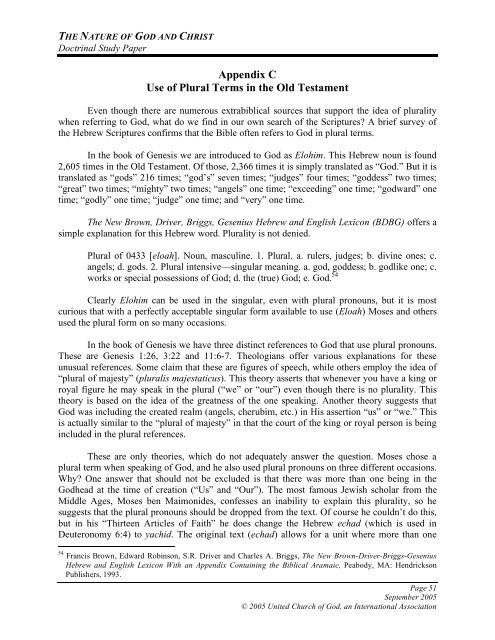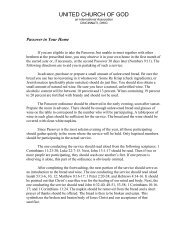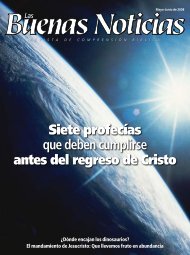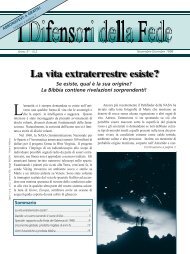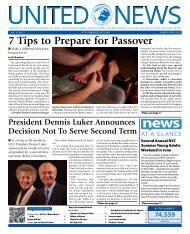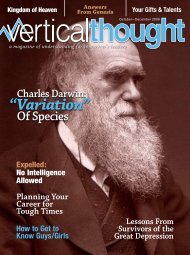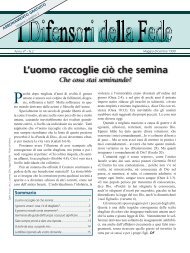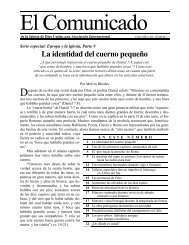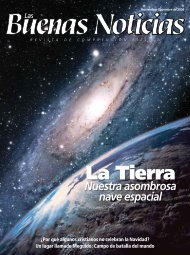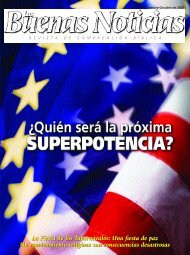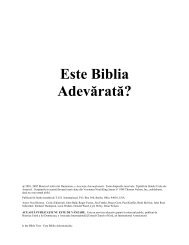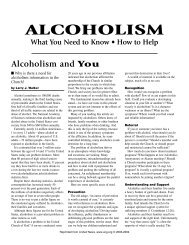The Nature of God and Christ - Members Site - United Church of God
The Nature of God and Christ - Members Site - United Church of God
The Nature of God and Christ - Members Site - United Church of God
- No tags were found...
Create successful ePaper yourself
Turn your PDF publications into a flip-book with our unique Google optimized e-Paper software.
THE NATURE OF GOD AND CHRISTDoctrinal Study PaperAppendix CUse <strong>of</strong> Plural Terms in the Old TestamentEven though there are numerous extrabiblical sources that support the idea <strong>of</strong> pluralitywhen referring to <strong>God</strong>, what do we find in our own search <strong>of</strong> the Scriptures? A brief survey <strong>of</strong>the Hebrew Scriptures confirms that the Bible <strong>of</strong>ten refers to <strong>God</strong> in plural terms.In the book <strong>of</strong> Genesis we are introduced to <strong>God</strong> as Elohim. This Hebrew noun is found2,605 times in the Old Testament. Of those, 2,366 times it is simply translated as “<strong>God</strong>.” But it istranslated as “gods” 216 times; “god’s” seven times; “judges” four times; “goddess” two times;“great” two times; “mighty” two times; “angels” one time; “exceeding” one time; “godward” onetime; “godly” one time; “judge” one time; <strong>and</strong> “very” one time.<strong>The</strong> New Brown, Driver, Briggs, Gesenius Hebrew <strong>and</strong> English Lexicon (BDBG) <strong>of</strong>fers asimple explanation for this Hebrew word. Plurality is not denied.Plural <strong>of</strong> 0433 [eloah]. Noun, masculine. 1. Plural. a. rulers, judges; b. divine ones; c.angels; d. gods. 2. Plural intensive—singular meaning. a. god, goddess; b. godlike one; c.works or special possessions <strong>of</strong> <strong>God</strong>; d. the (true) <strong>God</strong>; e. <strong>God</strong>. 54Clearly Elohim can be used in the singular, even with plural pronouns, but it is mostcurious that with a perfectly acceptable singular form available to use (Eloah) Moses <strong>and</strong> othersused the plural form on so many occasions.In the book <strong>of</strong> Genesis we have three distinct references to <strong>God</strong> that use plural pronouns.<strong>The</strong>se are Genesis 1:26, 3:22 <strong>and</strong> 11:6-7. <strong>The</strong>ologians <strong>of</strong>fer various explanations for theseunusual references. Some claim that these are figures <strong>of</strong> speech, while others employ the idea <strong>of</strong>“plural <strong>of</strong> majesty” (pluralis majestaticus). This theory asserts that whenever you have a king orroyal figure he may speak in the plural (“we” or “our”) even though there is no plurality. Thistheory is based on the idea <strong>of</strong> the greatness <strong>of</strong> the one speaking. Another theory suggests that<strong>God</strong> was including the created realm (angels, cherubim, etc.) in His assertion “us” or “we.” Thisis actually similar to the “plural <strong>of</strong> majesty” in that the court <strong>of</strong> the king or royal person is beingincluded in the plural references.<strong>The</strong>se are only theories, which do not adequately answer the question. Moses chose aplural term when speaking <strong>of</strong> <strong>God</strong>, <strong>and</strong> he also used plural pronouns on three different occasions.Why? One answer that should not be excluded is that there was more than one being in the<strong>God</strong>head at the time <strong>of</strong> creation (“Us” <strong>and</strong> “Our”). <strong>The</strong> most famous Jewish scholar from theMiddle Ages, Moses ben Maimonides, confesses an inability to explain this plurality, so hesuggests that the plural pronouns should be dropped from the text. Of course he couldn’t do this,but in his “Thirteen Articles <strong>of</strong> Faith” he does change the Hebrew echad (which is used inDeuteronomy 6:4) to yachid. <strong>The</strong> original text (echad) allows for a unit where more than one54 Francis Brown, Edward Robinson, S.R. Driver <strong>and</strong> Charles A. Briggs, <strong>The</strong> New Brown-Driver-Briggs-GeseniusHebrew <strong>and</strong> English Lexicon With an Appendix Containing the Biblical Aramaic, Peabody, MA: HendricksonPublishers, 1993.Page 51September 2005© 2005 <strong>United</strong> <strong>Church</strong> <strong>of</strong> <strong>God</strong>, an International Association


